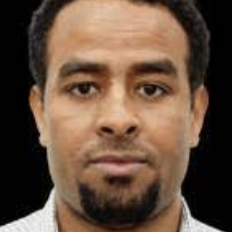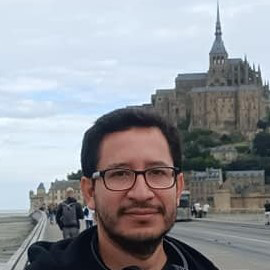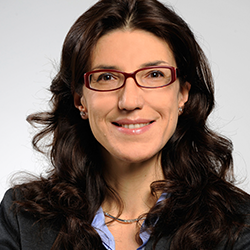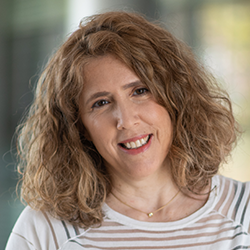 Simao
Simao
 Maria R Verdhelo
Maria R Verdhelo
 Yeman Brhane Hagos
Yeman Brhane Hagos
 Ruby Wood
Ruby Wood
 Quinche Zeng
Quinche Zeng
 Alfonso Estudillo-Romero
Alfonso Estudillo-Romero
 Omar Ali
Omar Ali
 Amar Kumar
Amar Kumar
 Florian Markowetz
Florian Markowetz
 Anant Madabhushi
Anant Madabhushi
 Inti Zlobec
Inti Zlobec
 Maria Gabrani (IBM Research - Zurich), Organizer
Maria Gabrani (IBM Research - Zurich), Organizer
 Michal Rosen-Zvi (IBM Research - Haifa), Organizer
Michal Rosen-Zvi (IBM Research - Haifa), Organizer
 Christopher Weight
Christopher Weight
 Jagadish Venkataraman
Jagadish Venkataraman
 Nathaniel Braman
Nathaniel Braman
 Chung.jpg) Pau-Choo (Julia) Chung
Pau-Choo (Julia) Chung
Introduction
Biomarkers play a central role in the growing practice of personalized medicine. Biomarkers are defined as physiologic measures that indicate the presence and characteristics of disease. Clinically, these measures define decision points in patient care by identifying risk, revealing genotypic insights, predicting treatment response, and beyond. The role of medical imaging in imaging biomarker discovery, driven by rapid innovation in the field of medical image analysis and machine learning, is currently being re-evaluated and expanded. Machine learning is creating a series of new roles for medical imaging in the biomarker assessment and discovery process including: automating laboratory protocols for established imaging biomarkers to boost laboratory efficiency and increase robustness,
- predicting non-imaging biomarkers from imaging data,
- discovering novel and subvisual image-based biomarkers to predict therapeutic outcomes,
- integrating imaging data with non-imaging outcomes for enhanced outcome prediction.
- applications span both tissue-based (e.g. haemoxylin and eosin (H&E) whole slide images, immunostaining, high throughput microscopy, spatial transcriptomics) and radiology-based imaging modalities. However, there is tremendous need for innovation to overcome issues common in medical image analysis but exacerbated in the context of biomarker discovery, for instance:
- learning from limited or incomplete, non-standardized datasets,
- multimodal data fusion
- explainability of the biomarkers being discovered
As the potential for medical image computing (MIC) to redefine the field of biomarker discovery is emerging, the dedicated MIABID Workshop, will bring together clinical, AI, regulatory, and pharmaceutical experts to review scientific progress and challenges in the development of AI-based MIC-assisted interventions to assist in Biomarker discovery, explainability, and translation. We aim to share technologies, experiences and observations and enable deeper understanding of the analytical power of the MIC technologies in detecting, quantifying, discovering, and validating biomarkers from images. We additionally hope to discover trends and the clinical applications of these developments, and elucidate their limitations and requirements for their adoption in clinical practice.
Program
AGENDA
MIABID Time: 15:40-19:10
15:40 Welcome (Maria)
15:45 Session I - Radiographic medical image analysis for biomarkers discovery (Chair: Nate)
15:50 "Counterfactual Image Synthesis for Discovery of Personalized Predictive Image Markers." Amar Kumar
16:10 "CoRe: An Automated Pipeline for The Prediction of Liver Resection Complexity from Preoperative CT Scans." Omar Ali
16:30 "Diffusion tensor imaging biomarkers for Parkinson's disease symptomatology." Alfonso Estudillo-Romero
16:50 Break
17:05 Session II -Histology medical image analysis for biomarkers discovery (Chair: Julia)
17:10 "Prediction of immune and stromal cell populations abundance from hepatocellular carcinoma whole slide images using weakly supervised learning." Qinghe Zeng
17:30 "Enhancing Local Context of Histology Features in Vision Transformers." Ruby Wood
17:50 "DCIS AI-TIL: Ductal Carcinoma in situ tumour infiltrating lymphocyte scoring using artificial intelligence." Yeman Brhane Hagos
18:10 "Predictive Biomarkers in Melanoma: Detection of BRAF Mutation using Dermoscopy." Maria R Verdelho
18:30 Panel- Medical Image Assisted BIomarkers’ Discovery: trends, challenges and what next? Chair: Chris Weight, Panelists: Michal Rosen-Zvi, Anant Madabushi, Florian Markowetz, Inti Zlobec
19:10 End
Call for workshop papers
You are kindly invited to submit your full paper to the MIABID workshop in MICCAI 2022..
The MICCAI 2022 workshop on Medical Image Assisted Biomarker Discovery (MIABID2022) will be a live event and will be held as part of MICCAI 2022 on September 18th, 2022.
In recent years, AI solutions have shown to be capable of assisting radiologists, clinicians, and even clinical trials’ organizers in detecting, grading, and staging diseases, assessing severity, automatically localizing and quantifying disease features, predicting responses or even treatment effectiveness. Imaging and image-extracted clinical biomarkers are a key enabler of targeted therapy and personalized treatment, and there has been substantial interest and early success in the application of AI-based medical image computing (MIC) technologies as a new avenue for biomarker discovery. Examples of how medical imaging AI-powered biomarkers can bring clinical value include:
- Automation of existing imaging biomarker workflows: Machine learning tools have the capability to streamline the quantification and assessment of established imaging biomarkers. Deep learning-based strategies have been shown to vastly improve performance and reduce subjectivity in image-based disease diagnosis and grading. Similarly, these tools can automate other clinical tasks such tissue staining quantification, identifying tumor infiltrating lymphocytes on whole slides images, or measurement of tumor burden radiology exams.
- Image-based prediction of non-imaging biomarkers: An active area of research development has been the prediction of established non-imaging biomarkers from imaging alone. The disciplines of "radiogenomics" and "histogenomics" attempt to predict genotypic information from standard of care radiology or H&E digital pathology images, respectively. These techniques could enable targeted therapies for a greater portion of patients globally by increasing access to corresponding companion diagnostics.
- Novel image-based biomarker discovery: A rapidly growing body of research has sought to leverage advances in medical image analysis to discover a new category of novel, quantitative imaging biomarkers. Such techniques might leverage hand-crafted computational imaging features (e.g. image texture, shape features, cellular graphs) - commonly referred to as "radiomics" and "pathomics" - to predict patient outcomes. Others have leveraged deep learning tools towards this end, for instance training convolutional neural network-based classifiers to predict response to treatment or estimate a patient's survival following a treatment from standard of care medical images.
- Multimodal integration of imaging and non-imaging biomarkers: As has been demonstrated, there is orthogonal information present in various data modalities - molecular data, clinical data, Histopathology slides and Radiology images - that can be effectively combined to create more poignant treatment response predictors and survival estimators. Future such examples can lay the foundation for a broad, generalizable framework that can translate across cancer types and clinical endpoints.
Such techniques have the potential to address considerable gaps in existing clinical biomarkers and guide treatments currently lacking reliable companion diagnostics. However, they necessitate innovation to overcome issues that are common in medical imaging but exacerbated in the context of biomarker discovery: for instance, extremely limited training data and error-prone, biased labels.
The objective of this workshop is to better understand the work needed to reach the standards of AI-based MIC-assisted biomarker discovery in clinical practice. The aim is to fortify and make its role stronger, more effective, and wider adopted, particularly, as the underlying requirements increase, and the problem becomes more complex. The sensitivity of this clinical use heightens the importance of numerous technologies, from interpretability to uncertainty quantification. Elegant solutions to these obstacles will be essential to realizing the potential of AI-based MIC-derived biomarkers to inform and guide patient care.
In this workshop we aim to enable multidisciplinary experts to share the latest trends in AI- based MIC-technologies for biomarker discovery and discuss their effectiveness, adoption, and potential areas to steer further research.
The workshop will include the following three sections, two polls and a panel:
Session 1: What are the latest technologies and trends in radiographic medical image analysis for biomarkers discovery? What is the role and acceptance in clinical practice? What are remaining obstacles and how to address them?
Session 2: What are the latest technologies and trends in histology medical image analysis for biomarkers discovery? What is the role and acceptance in clinical practice? What are remaining obstacles and how to address them?
Session 3: What is the role of combining biomarkers from multiple modalities? What multimodal data integration technologies work and under what conditions? What value can we gain from analysis of multi-modal data?
Polls: Polls, designed to collect information from attendees regarding their perspective on the questions defining the 3 sessions, and in particular aiming at sharing trends, limitations and best practices, will be performed before and after the Sessions.
Panel: A panel, with highly selected invited experts, at the end of the day, will address the most debatable topics and the most complex dilemmas.
We invite computational and domain experts to submit one of three types of submissions:
(1) An innovative technological solution (2) A Meta-analysis (3) A perspective
Papers will consist of a maximum of 8 pages (text, figures and tables) + up to 2 pages for references only. They should be submitted electronically in LNCS style, to the CMT system, latest by June 25th. Submission guidelines are similar to the MICCAI main conference. The submission should be blinded. Accepted papers will be published in the MICCAI Proceedings in the Springer LNCS Series. All workshop submissions must be original and cannot already be published or considered for publication elsewhere (with the explicit exception of arXiv.org as a form of prepublication of MICCAI contributions).
Looking forward to your submission,
Maria Gabrani Michal Rosen-Zvi Christopher Weight Jagadish Venkataraman Nathaniel Braman Pau-Choo (Julia) Chung
Organizing Committee

Maria Gabrani, Manager, Cognitive Healthcare and Lifesciences, IBM Research - Zurich, Switzerland.
-
Bio
Maria Gabrani is a Research Staff Member at IBM Research Zurich since 2001. Her research has focused on image processing and pattern recognition techniques, used to extract meaningful information from data in different application areas, from medical imaging to computational pathology. She is currently a manager of the Cognitive Healthcare and Lifesciences group that focuses on ingesting, analyzing and integrating textual, imaging and molecular data for building health knowledge and disease understanding and supporting decision making in numerous applications, from medical triage, to diagnosis, prognosis and treatment selection and treatment monitoring. She has also global IBM Research roles, as one of the strategists in Future of Health and specifically in the areas of oncology and knowledge representation, as well as a member of the Exploratory Lifesciences Council of IBM Research. Before joining IBM, from 1999 until 2001, Maria worked for Philips Research, in Eindhoven, The Netherlands. She holds a Ph.D and MS degree in Electrical and Computer Engineering from Drexel University, Philadelphia, PA, USA, and a Diploma in Electrical Engineering from Aristotle University, Thessaloniki Greece. She has received numerous awards including several Outstanding technical Achievement awards, from IBM Corporation, and Technical Achievement Award, from IBM Research Division and numerous best paper awards, from NASA/Goddard Space Flight Center, Image Registration Workshop (1997), to GRAIL best paper award, MICCAI (2020), and more than 40 patents.

Michal Rosen-Zvi, Director of AI for accelerated HC&LS discovery at IBM Research and a visiting Professor at the Faculty of Medicine, The Hebrew University, Israel
-
Bio
Dr. Rosen-Zvi is a Director of health informatics at IBM Research and a visiting professor at the Faculty of Medicine, The Hebrew University. At IBM Research she co-leads the research strategy of a worldwide team who are experts in AI applied to health data and she is the local senior manager of the IBM Research Haifa department who focuses on deep learning, machine learning and casual inference technologies applied to patients data. Michal holds a PhD in computational physics and completed postdoctoral studies at UC Berkeley, UC Irvine, and the Hebrew University in the area of Machine Learning. She joined IBM Research in 2005 and has since led various projects in the area of machine learning and healthcare. Michal has published more than 40 peer-reviewed papers and served as program committee in conferences such as AAAI, ICML and UAI and reviewer in journals such as Machine Learning and Nature. She serves at various boards and committees such as the Israeli national digital health committee and is elected to serve at the managing board of the Israeli Society of HealthTech.

Christopher Weight, Center Director Urologic Oncology, Cleveland Clinic, Minneapolis, MN, USA
-
Bio
Christopher Weight is the Center Director for Urologic Oncology at the Cleveland Clinic.
He also directs the SUO Urologic Oncology Fellowship at Cleveland Clinic. He is a graduate of University of Utah School of Medicine. After completing medical school, Dr. Weight successfully completed his residency at Cleveland Clinic and fellowship in Urologic Oncology at the Mayo Clinic.
During this time he also completed a Master’s Degree in Clinical and Translational Research at the Mayo Graduate School. He splits his time between patient care, education and research. He has published over 125 articles, and is an NIH funded researcher as either a PI or Co-I on four R01 grants.
His areas of research have focused on environmental exposures that may lead to genitourinary cancers as well as utilizing artificial intelligence to help personalize the treatment of patients with GU malignancies. He is the clinical director of KiTS21. Finally,
Dr. Weight is passionate about celebrating and elevating those affected by kidney cancer through the non-profit organization he founded called Climb 4 Kidney Cancer.

Jagadish Venkataraman, Senior Director, AI, Tempus Labs, Redwood City, CA, USA
-
Bio
Jagadish Venkataraman has a PhD in wireless communications and information theory from the University of Notre Dame.
He spent the early parts of his career in the semiconductor industry and later in the navigation industry.
Hobby collaborations with a professor in UCSF in the biomedical engineering space triggered his passion for the Healthcare space.
He worked on machine vision applications for laparoscopic procedures at Stryker Endoscopy and later was part of the early research team that laid the foundation for perception targets for the Verb / Verily surgical robot to enhance surgeon experience both in real time and offline.
At Alphabet, as part of Calico Life Sciences, he led computer vision efforts in aging related studies across a range of model organisms from yeast to humans.
Currently, he is Senior Director, AI at Tempus Inc where he leads efforts for the adoption of AI in Oncology and Cardiology to enable precision medicine for all.

Nathaniel Braman, Senior Director of AI, Picture Health, Cleveland, OH, USA
-
Bio
Nathaniel Braman is Senior Director of AI at Picture Health, where he is developing medical imaging tools for monitoring treatment response and predicting therapeutic outcomes from radiology data.
Previously, he worked as a Machine Learning Scientist at Tempus Labs on developing deep learning approaches to integrate radiology with molecular and digital pathology data for multimodal oncology decision support.
He received his PhD with distinction from Case Western University in 2020, supported by predoctoral fellowships from the National Cancer Institute (NCI) and National Institute of Biomedical Imaging and Bioengineering (NIBIB) of the NIH. During this time, Nathaniel also completed an internship with the Medical Imaging Solutions Group at IBM Research, where he worked to develop weakly supervised learning approaches for the incidental diagnosis of lung disease in CT scans.
He holds 8 patents and 20 publications in the area of medical image analysis and precision medicine.
He has previously organized the 2019 and 2020 Educational Challenges of the MICCAI society, and is on the organizing committee for the 2023 MICCAI meeting.
 Chung.jpg)
Pau-Choo (Julia) Chung, Professor, Institute of Electrical Engineering, National Cheng Kung University, Tainan City, TW
-
Bio
Pau-Choo (Julia) Chung (S’89-M’91-SM’02-F’08) received the Ph.D. degree in electrical engineering from Texas Tech University, USA, in 1991. She then joined the Department of Electrical Engineering, National Cheng Kung University (NCKU), Taiwan, in 1991 and has become a full professor in 1996. She served as the Head of Department of Electrical Engineering(2011-2014), the Director of Institute of Computer and Communication Engineering (2008-2011), the Vice Dean of College of Electrical Engineering and Computer Science (2011), the Director of the Center for Research of E-life Digital Technology (2005-2008), and the Director of Electrical Laboratory (2005-2008), NCKU.
She was elected Distinguished Professor of NCKU in 2005 and received the Distinguished Professor Award of Chinese Institute of Electrical Engineering in 2012. She also served as Program Director of Intelligent Computing Division, Ministry of Science and Technology (2012-2014), Taiwan, the Director General of the Department of Information and Technology Education at Ministry of Education, Taiwan.
Currently, she is the Dean of College of Electrical Engineering and Computer Science, and the Dean of Miin Wu School of Computing, at National Cheng Kung University, Taiwan.
Dr. Chung’s research interests include computational intelligence, machine learning, medical image analysis, pattern recognition and pathology image analysis. She currently is focusing on Whole Slide Image (WSI) pathology image analysis and has built ALOVAS platform. She served as an Associate Editor of IEEE Transactions on Neural Network and Learning Systems and an Associate Editor of IEEE Transactions on Biomedical Circuits and Systems. Currently she is an Associate Editor of IEEE Transactions on Artificial Intelligence.
Dr. Chung served on two terms of ADCOM member (2009-2011, 2012-2014), the Chair of CIS Distinguished Lecturer Program (2012-2013), the Chair of Women in Computational Intelligence (2014), and the Vice President for Members Activities of IEEE CIS Society. She also served on two terms of BoG member in IEEE Circuit and Systems Society. She is a Member of Phi Tau Phi honor society and is an IEEE Fellow since 2008. Currently she serves as the Vice President for Education of IEEE CIS.
Reviewers (list incomplete)
- Antonio Foncubierta Rodriguez, IBM Research, Switzerland
- Michal Ozery-Flato, IBM Research, Israel
- Alvaro UlloaCerna, Geisinger, USA
- Geoffrey Schau, Tempus Labs USA
- Dezso Ribli, ELTE Institute of Physics
- PABLO MEYER ROJAS, IBM Research, US
- Kenney Ng, IBM Research, US
- Chun-Rong Huang, National Chung Hsing University
- Jui-Hung Chang, National Cheng Kung University
- Ruey-Feng Chang, National Taiwan University
- Chuan-Yu Chang, National Yunlin University of Science and Technology
- Kuo-Sheng Cheng, National Cheng Kung University
- Zhiping Lin, Nanyang Technological University
- Hsmin Chen, Taichung Veteran General Hospital, Taiwan
- Prateek Prasanna, Stonybrook University
- Amogh Hiremath, Picture Health, USA
Registration
Please register to MICCAI SATELLITE EVENTSin order to attend the MIABID22 workshop.
For hybrid format registration pending by MICCAI organization
Important Dates
| Circulation of call for papers: | May 15, 2022 |
| Paper submissions due: | June 27, 2022 (extended) |
| Notification of Acceptance: | July 16, 2022 |
| Camera ready paper due: | July 30, 2022 |
| Workshop proceedings due: | August 6, 2022 |
| Workshop date: | September 18, 2022 3:40-19:10 SGT time |